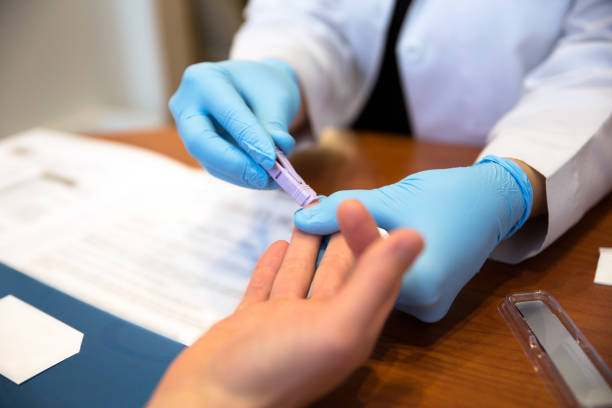Symptoms of HIV/AIDS
HIV (Human Immunodeficiency Virus) is a virus that attacks the body’s immune system, making it harder to fight off infections and diseases. If left untreated, HIV can progress to AIDS (Acquired Immunodeficiency Syndrome), the most severe stage of the infection. Understanding the symptoms of HIV/AIDS and seeking timely treatment is crucial to managing the condition and leading a healthy life.
We will explore the symptoms of HIV/AIDS, its causes, and the importance of early detection. For treatment and medical consultation, we recommend seeking help from qualified doctors. You can easily access medical support on the Virtual Doctors App or download the Virtual Doctors Healthplus App on Google Play.
The Symptoms of HIV/AIDS: What Causes HIV?
HIV is primarily spread through contact with certain bodily fluids from a person infected with the virus. These fluids include:
- Blood
- Semen
- Vaginal fluids
- Breast milk
The virus can enter the body through unprotected sexual contact, sharing of needles, blood transfusions with contaminated blood, or from mother to child during pregnancy, childbirth, or breastfeeding.
Once HIV enters the body, it targets and destroys immune cells, specifically the CD4 cells (T-cells), weakening the immune system over time.
Symptoms of HIV/AIDS: What Are the Symptoms of HIV?
The symptoms of HIV vary depending on the stage of the infection. In some cases, individuals may not experience any symptoms for years, while others may show signs of illness early on. HIV progresses in three stages: Acute HIV Infection, Chronic HIV Infection, and AIDS.
1. Acute HIV Infection (Early Stage)
symptoms of HIV/AIDS
This stage occurs 2 to 4 weeks after being infected with the virus. Some people may develop flu-like symptoms during this period, which is also known as acute retroviral syndrome (ARS). These early symptoms can be mistaken for other viral infections, so it’s important to get tested if you’ve been exposed to HIV.
Common symptoms during the early stage include:
- Fever: A high fever is one of the first signs of HIV infection.
- Fatigue: Extreme tiredness and weakness, even after rest.
- Swollen Lymph Nodes: Swelling in the lymph nodes, especially in the neck, armpits, and groin.
- Sore Throat: Persistent throat pain, often accompanied by other cold-like symptoms.
- Muscle and Joint Pain: General aches and pains in the muscles and joints.
- Rash: A red rash that may appear on the body.
- Headache: Mild to severe headaches.
- Night Sweats: Waking up drenched in sweat, even in a cool room.
These symptoms can last for a few days to several weeks. After the acute stage, the virus continues to replicate in the body, but symptoms may not reappear for many years.
2. Chronic HIV Infection (Asymptomatic Stage)
During this stage, the virus remains active but reproduces at lower levels. Many people do not experience any noticeable symptoms during this period. This stage can last for several years, and without treatment, the virus will eventually weaken the immune system to the point where the person becomes vulnerable to infections and diseases.
3. AIDS (Advanced Stage of HIV)
If HIV is left untreated, it can progress to AIDS, which is the final and most severe stage of HIV infection. At this stage, the immune system is severely damaged, and the body becomes highly susceptible to opportunistic infections (infections that occur in people with weakened immune systems).
Symptoms of AIDS include:
- Rapid Weight Loss: Unexplained and significant weight loss.
- Recurring Fever: Frequent bouts of fever.
- Chronic Diarrhea: Ongoing diarrhea that lasts for more than a week.
- Severe Fatigue: Persistent and extreme tiredness.
- Pneumonia: Serious lung infections, such as pneumocystis pneumonia.
- Skin Lesions: Sores or lesions on the skin, mouth, or genitals that do not heal.
- Memory Loss and Neurological Issues: Difficulty concentrating, memory problems, and other cognitive issues.
When to Seek Medical Help
Early detection and treatment of HIV are essential for managing the condition and preventing its progression to AIDS. If you experience any of the symptoms mentioned above, especially after potential exposure to the virus, it’s crucial to get tested for HIV. Even if you do not have symptoms, regular HIV testing is important, especially if you are at risk.
HIV is diagnosed through a blood test that checks for the presence of HIV antibodies or the virus itself. The earlier you know your status, the sooner you can start treatment.
How to Get Treatment for HIV/AIDS
While there is no cure for HIV, antiretroviral therapy (ART) is highly effective in controlling the virus. ART helps reduce the viral load in the body to undetectable levels, allowing individuals to live long, healthy lives and reducing the risk of transmission to others.
It’s essential to begin treatment as soon as possible after diagnosis. For professional advice and treatment options, we recommend consulting a qualified doctor on the Virtual Doctors App. You can also download the Virtual Doctors Healthplus App on Google Play for convenient access to healthcare services from the comfort of your home.
Prevention of HIV
Preventing HIV infection is key to stopping its spread. Here are some effective prevention methods:
- Practice safe sex by using condoms correctly every time you have sex.
- Get tested regularly for HIV and other sexually transmitted infections (STIs).
- Avoid sharing needles or any other drug injection equipment.
- Consider pre-exposure prophylaxis (PrEP), a medication that can prevent HIV for individuals at high risk.
Symptoms of HIV/AIDS:
HIV/AIDS is a serious condition, but with early diagnosis and proper treatment, individuals can manage the virus and live healthy lives. Recognizing the symptoms of HIV and seeking medical help is the first step toward controlling the infection.
If you suspect you’ve been exposed to HIV or are experiencing any symptoms, consult a doctor immediately. You can book an appointment with a qualified doctor on the Virtual Doctors App or download the Virtual Doctors Healthplus App on Google Play for easy access to medical care.
